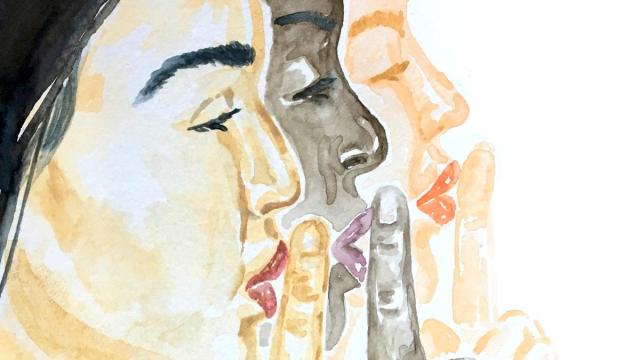The conventional guideline for sharing the news of a pregnancy is that you should wait until the ceremonial 12 or 13-week mark, the endpoint of the most anxiety-ridden first trimester when most pregnancy losses are diagnosed. What the rule is really saying is: Don’t get too excited. But what if you do have a miscarriage? You’re left alone to navigate your tragedy, one that you did nothing to cause, one that so many others have experienced, too.
A growing movement called #IHadAMiscarriage is making the case for sharing the news of your pregnancy early — if you want to. Launched by psychologist Jessica Zucker, the social media campaign (which recently added free art prints like the one above) aims to break the stigma and shame surrounding pregnancy and infant loss by encouraging women to build up their support systems during those early weeks when everything feels so fragile.
“We zero in on the age-old notion that women should wait to share their pregnancy news until they are ‘out of the woods’ after the first trimester,” Zucker tells me. “This recommendation essentially translates into: ‘Don’t share your good news in case it becomes bad news so that you won’t have to share the bad news.’ We need to rethink this [conceptualisation] of sharing our news in an effort to bolster support for women in pregnancy, no matter the outcome.”
In order to “disband the culture of silent grief,” Zucker believes parents-to-be should be provided with statistical facts about miscarriage, stillbirth, and infant loss, and then given the freedom to decide whom to tell, and when. When I found out I was pregnant with my daughter, I was like a balloon with a tiny pinhole, releasing the news little by little, to my sister shortly after I peed on the stick, to my immediate family not long after that, to my boss around seven weeks, to close friends around 10 weeks, and to the Facebook universe around 14 weeks.
That was a timeline that just worked for me and my husband.
Zucker makes it clear that the movement isn’t a call for people stand on the rooftops and wave their positive pregnancy tests in the air like they just don’t care. “It’s important to be thoughtful about who you’d like to have in that inner circle, your tribe,” she says. There are lots of considerations to make before deciding when to tell people the news. Ask yourself these questions about:
Your friends: Do you trust the person? As Brené Brown says, “you share with people who have earned the right to hear your story.”
Your manager and HR: What’s your company culture like? Do you feel there would be any unconscious bias against new parents? (If so, you may want to wait to share the news until later in the pregnancy?) Do you have any occupational exposures that are unsafe for pregnancy?
Your social media friends: Are you prepared for the onslaught of attention and (often unsolicited) parenting advice?
And then share away — if it feels right. Zucker says that with this chapter of her campaign, she wants for people to be able to “relish the joy, even if that joy may turn to grief.”

Comments
One response to “When Should You Share Your Pregnancy News? ”
“But what if you do have a miscarriage? You’re left alone”
Not really, you can talk to specific friends about it even if they never knew . Much better than having to spend weeks explaining to everyone that you had a miscarriage. In my opinion…